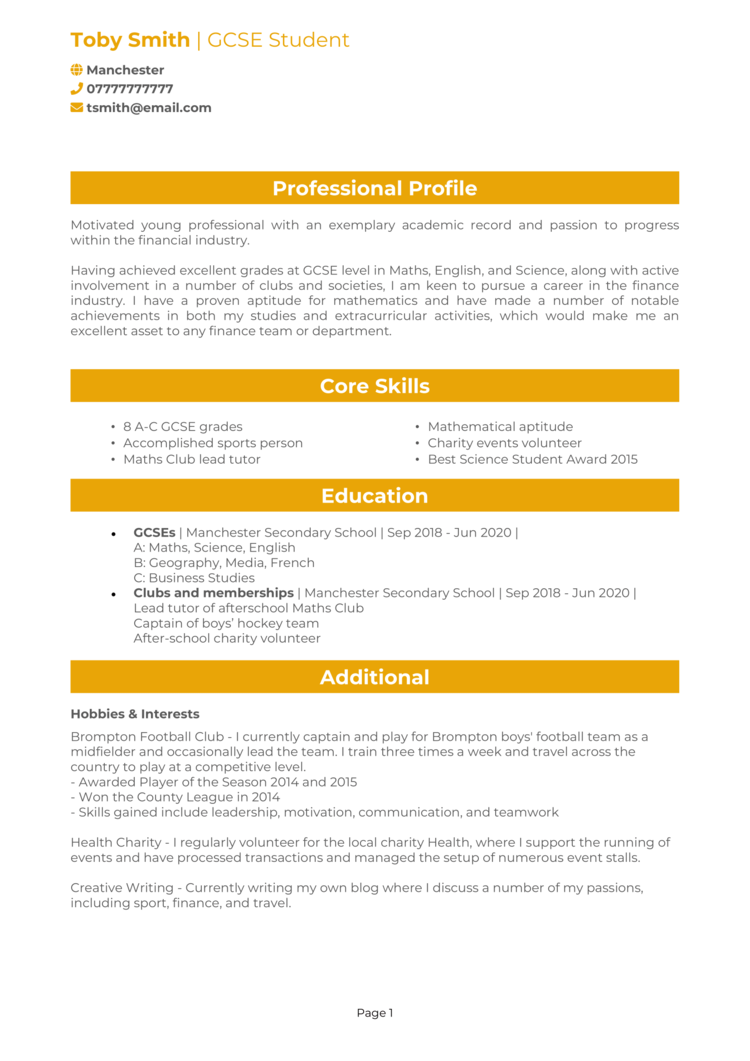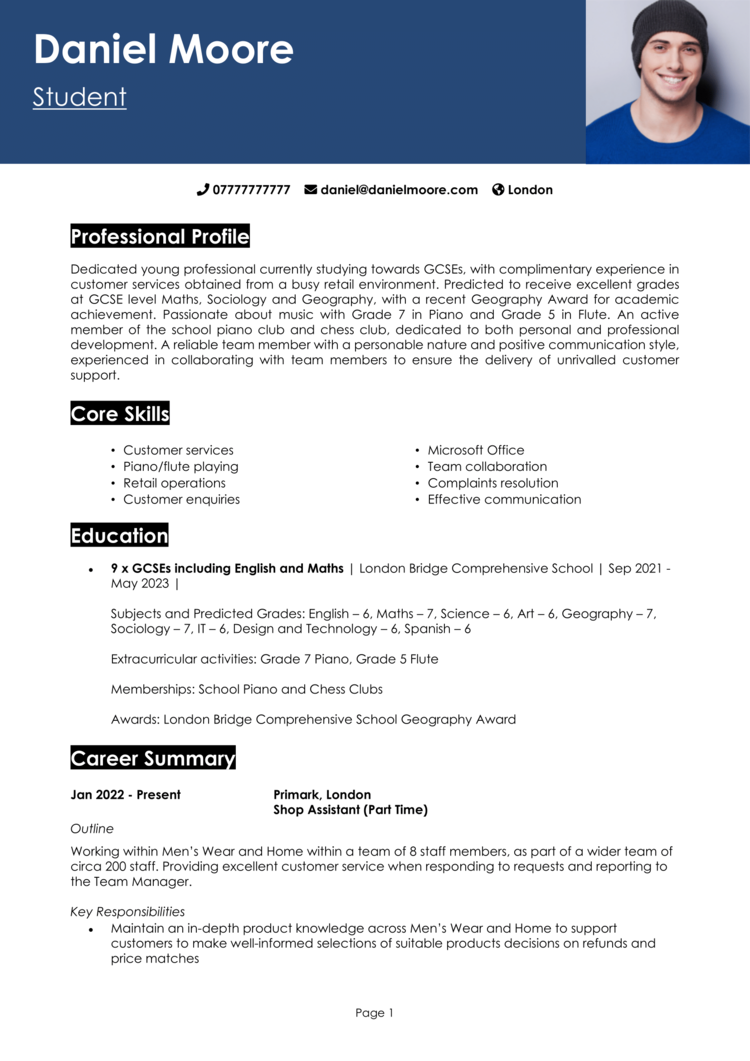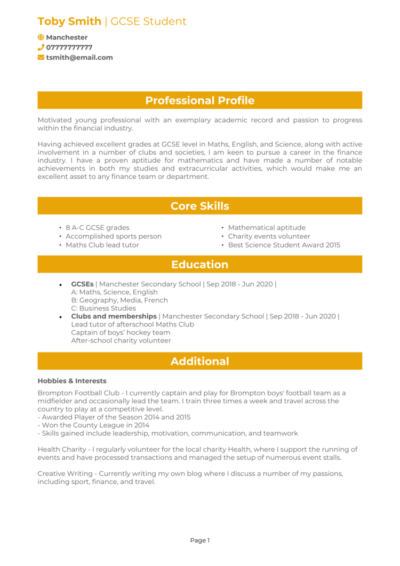You might not have years of experience under your belt, but that doesn’t mean you don’t have what it takes to land a great job. Employers aren’t expecting a long work history at 16 – they just want to see what you can bring to the role.
A strong CV can help you secure your first job, whether it’s a part-time role, an apprenticeship, or work experience. This guide, along with some CV examples of a 16 year old candidate, will walk you through exactly how to structure it, what to include, and how to make sure your skills stand out.
16-year-old CV example (with no experience)

16-year-old CV example (with part-time experience)

How to write your CV as a 16-year-old
Learn how to create your own interview-winning CV with this simple step-by-step guide.
Writing a CV at 16 might seem tricky, especially if you’ve never had a job before. The good news? You’ve already got experience – you just don’t know it yet. Whether it’s school projects, extracurricular activities, or convincing your teachers to give you an extension, you’ve built up useful skills without even realising it.
This guide will show you how to format your first CV correctly, highlight your skills, and showcase your potential – even if your only experience so far is school projects, helping out at home, or being part of a club or team.
Structuring your 16-year-old CV


A strong CV should be neatly structured – think of it like an exam paper: clear sections, easy-to-read answers, and absolutely no unnecessary waffle. When your information is ordered with a clear and logical layout, recruiters can quickly find the details they’re looking for, making your application more effective.
A strong CV should include:
- Name and contact details – Clearly display personal details at the top so employers can reach you easily. You’re able to add a photo of yourself, but it’s entirely optional and usually not expected.
- Profile – Kick off with a short introduction that summarises your strengths and career goals.
- Core skills – A quick list of your most valuable skills, tailored to the job you’re applying for.
- Work experience – Any jobs, volunteering, or responsibilities that have helped you build transferable skills.
- Education – List your current qualifications, including subjects studied and predicted grades.
- Additional info – Any relevant hobbies, interests, or awards that show your skills in action.
16-year-old CV format


First impressions matter, and a good CV format tells employers that you’re organised and professional. It also stops them from thinking you just copy-pasted something off the internet five minutes before applying.
Since employers don’t spend long reviewing applications, everything in your CV should be as easy to read as possible: you’re free to use a downloadable Word or Google Docs template if it makes it easier.
Here’s some tips to make sure your CV looks its best:
- Bullet points – These help break up text and make key information stand out.
- Divide sections – Keeping your CV clearly structured helps recruiters find what they need quickly.
- Use a clear and readable font – The font should be neat and professional, without distracting styles or colours.
- No more than 1 page – Your CV should be short and to the point. If you find yourself approaching page two, either you’ve had a wildly impressive life already, or you’re dedicating way too much length about your Year 9 Geography project.
16-year-old CV profile


Your CV profile (or personal statement) is a short paragraph at the top of your CV that sums up who you are and what you’re looking for. Since you may not have much work experience, this is your chance to make a strong first impression by highlighting your skills, enthusiasm, and potential.
This section should be kept short and to the point, giving employers a quick overview of why you’d be a great candidate. Consider a cover letter if you want to cover more ground.
16-year-old CV profile examples
Profile 1
Hardworking and motivated student currently completing GCSEs, with strong academic performance in Mathematics, English, and Business Studies. Developed excellent communication and teamwork skills through school projects and volunteering experiences. Proficient in Microsoft Office and comfortable handling customer service tasks, problem-solving, and organisation. Known for reliability and a positive attitude, eager to contribute to a dynamic work environment. Looking for an entry-level role in retail or hospitality to gain practical experience and develop professional skills.
Profile 2
Responsible and enthusiastic candidate currently studying for GCSEs, excelling in IT, Design Technology, and English. Experienced in working with others through group projects, volunteering, and babysitting, demonstrating strong time management and adaptability. Skilled in handling customer interactions, managing tasks efficiently, and learning new skills quickly. Aiming to secure a part-time position in a retail or service environment to develop workplace experience, enhance customer service abilities, and build a strong foundation for future career opportunities.
What to include in your 16-year-old CV profile
A great profile or personal statement will:
- Introduce yourself – Mention that you’re a motivated and hardworking 16-year-old looking for your first job.
- Highlight key skills – Emphasise qualities such as reliability, communication, teamwork, and willingness to learn.
- Note any work experience – You’re not expected to have loads, but if you do, then definitely make a note of it!
- State what you’re looking for – Clearly explain the type of role or opportunity you’re applying for and why.
Core skills section


A core CV skills section is a simple way to show employers what you’re good at in just a few bullet points. It highlights the abilities that make you a strong candidate, even if you have no work experience.
Employers will be looking for skills that apply to the job you’re applying for, so this section should focus on relevant strengths. Since these skills can be gained from school, clubs, or volunteering, think about where you’ve used them in everyday life and make sure they’re clearly listed.
Struggling to write a CV with no work experience?
Our CV builder helps younger candidates craft a strong first CV with beginner-friendly templates, expert tips, and ready-made content to highlight your transferable skills and potential.
Top skills to highlight in your CV as a 16-year-old
- Time Management – Balancing school, extracurricular activities, and responsibilities effectively.
- Team Collaboration – Working well with peers on group projects, sports teams, or volunteer activities.
- Adaptability – Quickly learning new tasks, environments, and responsibilities.
- Customer Service – Providing friendly and helpful assistance in retail, hospitality, or volunteer roles.
- Basic IT Skills – Proficiency in Microsoft Office, Google Workspace, and social media platforms.
- Cash Handling – Managing transactions accurately in retail, cafes, or fundraising events.
- Problem-Solving – Thinking critically to overcome challenges in school, work, or personal projects.
- Communication – Expressing ideas clearly in writing, presentations, or customer interactions.
- Organisation – Keeping track of assignments, schedules, and responsibilities efficiently.
- Willingness to Learn – Demonstrating enthusiasm for training, feedback, and skill development.
Structuring your education section


Since you’re still in education, this section is particularly important. Employers will want to see what you’re studying and whether your subjects align with the role you’re applying for.
Include your school name, the years you’ve attended, and the subjects you’re studying. If you have predicted grades, these can be added as well. Any additional qualifications, such as IT courses, first aid training, or extracurricular certifications, should also be included.
If you’re applying for an apprenticeship or a role where academic achievements are important, you might want to mention any standout subjects or relevant coursework. Otherwise, this section should be kept brief.
Example education sections
Education 1
GCSEs (9 Achieved: 6x A-C, 3x D) | Manchester High School | 2022–2024
Subjects include English Language (B), Mathematics (B), Science (A), Geography (C), and Business Studies (A). Developed strong research, problem-solving, and communication skills through coursework and projects.
Education 2
GCSEs (8 Achieved: 5x A-C, 3x D) | Birmingham Academy | 2021–2023
Subjects include English Literature (B), Mathematics (C), Science (B), History (A), and ICT (B). Gained experience in independent learning, teamwork, and analytical thinking through various coursework and assignments.
What to include in your education section
For each qualification, add the following info:
- Qualification & organisation – State the qualification (e.g. GCSE) and where you studied it
- Dates studied – Note the dates you started, and your finish (or expected) finish date
- Extra details – If they are particularly pertinent to the job, give a little extra detail on certain subjects or projects.
Most valuable qualifications for a 16-year-old
- GCSEs (or equivalent qualifications) – The main academic qualifications employers will look at, showing subject knowledge and key skills.
- First Aid Training – Demonstrates responsibility and can be useful for retail, hospitality, childcare, and other customer-facing roles.
- Food Hygiene Certificate – Essential for jobs in catering, restaurants, or any role involving food preparation.
- IT or Digital Skills Certification – Qualifications like the ECDL (European Computer Driving Licence) or equivalent courses show basic computer proficiency, which is valuable in most jobs.
- Duke of Edinburgh Award (DofE) – Recognised by employers as proof of teamwork, problem-solving, and commitment to challenges.
Work experience


Your work experience section is where you list any roles, tasks, or responsibilities you’ve taken on that show your ability to work in a professional environment.
This can include part-time retail jobs, volunteering, internships, or even informal roles like babysitting or helping with family businesses.
If you don’t have any direct experience, don’t worry – there are plenty of ways to demonstrate skills gained through school, projects, and personal responsibilities. Even small tasks can show important qualities like reliability, problem-solving, or communication skills, so don’t underestimate what you’ve done!
Work experience should be listed in reverse chronological order, starting with the most recent.
How to structure jobs

- Outline – Briefly introduce where you worked or volunteered and what the role involved.
- Responsibilities – Describe what you did, using action words like “assisted,” “helped,” and “organised” to show your contribution.
- Achievements – If possible, highlight any results or skills you gained, such as improving confidence, learning a new skill, or managing a responsibility.
Job examples for a 16-year-old
Babysitter | Freelance
Outline
Provided safe and engaging childcare for multiple families, ensuring the well-being and entertainment of children in a home setting.
Responsibilities
- Supervised children, ensuring their safety and well-being at all times.
- Prepared simple meals and snacks, catering to dietary needs.
- Engaged children in activities such as arts, crafts, and reading.
- Assisted with bedtime routines, including storytime and ensuring a calm environment.
- Communicated with parents about children’s activities and behaviour.
Achievements
- Maintained a 100 percent positive feedback rate from families.
- Developed strong problem-solving and patience skills through childcare responsibilities.
- Earned repeat babysitting opportunities due to reliability and trustworthiness.
Volunteer Assistant | Community Centre
Outline
Supported community events and activities by assisting organisers with event setup, customer service, and general support.
Responsibilities
- Helped set up and pack away tables, chairs, and decorations for events.
- Assisted in greeting guests and answering questions about event schedules.
- Distributed leaflets and promotional materials to raise awareness of community initiatives.
- Provided support during fundraising activities and charity events.
- Helped keep the venue clean and organised before, during, and after events.
Achievements
- Contributed to a successful charity event that raised over £1,000 for local causes.
- Recognised by organisers for enthusiasm and willingness to help.
- Developed communication and teamwork skills through interactions with event attendees.
Additional info


The additional info section is an optional part that can be added to the bottom of your CV, for things like hobbies and interest, languages or awards.
Here you should had anything that might help recruiters see that you are good fit for the role
Good additional info for a 16-year-old’s CV
- Hobbies – Include activities that showcase skills like creativity, problem-solving, or teamwork. Sports, gaming, music, or creative writing can demonstrate valuable traits.
- Volunteering – Any unpaid experience, such as helping at events, charity work, or assisting in a family business, highlights initiative and responsibility.
- School Awards and Achievements – Recognition for academic excellence, sports, or extracurricular participation demonstrates dedication and motivation.
- Extracurricular Activities – Participation in clubs, student councils, or school projects shows teamwork, leadership, and initiative.
- Skills and Certifications – Any self-taught skills, online courses, or qualifications (such as First Aid or Duke of Edinburgh) add credibility and show a willingness to learn.
Additional info example
Additional info
Hobbies
Graphic design – Created digital artwork and posters for school events, improving creativity and technical skills.
Gaming – Developed teamwork and problem-solving through competitive online strategy games.
Photography – Captured and edited images for a personal blog, experimenting with visual storytelling.
Volunteering
Charity shop assistant – Helped with organising stock and serving customers, improving customer service and teamwork.
Peer tutoring – Supported younger students in maths, developing communication and mentoring abilities.
School Awards and Achievements
Student of the Month – Recognised for commitment to studies and positive contributions to the school community.
School football team captain – Led the team in local tournaments, fostering leadership and teamwork.
Extracurricular Activities
Drama club member – Performed in school productions, improving confidence and public speaking.
Eco club volunteer – Helped organise recycling initiatives and awareness campaigns within the school.
Skills and Certifications
Basic coding (Python) – Completed an online introduction to programming, building simple projects.
First Aid certified – Trained in CPR and emergency response through a school-led course.





